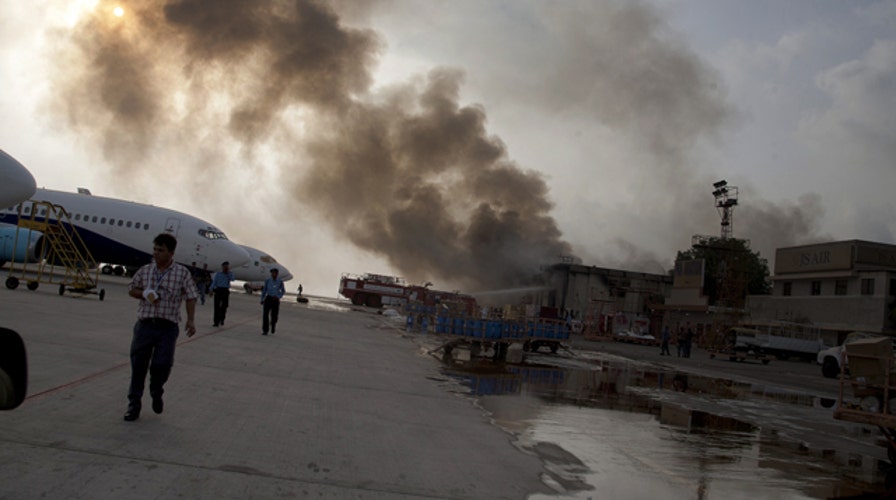Pakistani Taliban claim responsibility for airport attack
Conor Powell reports from Jerusalem, Israel
The Pakistani Taliban threatened more violence Monday after claiming responsibility for an attack that killed 28 people at the country's busiest airport in Karachi Sunday.
Shahidullah Shahid, the spokesman for Tehrik-e-Taliban Pakistan, said in a statement Monday that the insurgents carried out the attack at the Jinnah International Airport in Karachi as "revenge for the killing of Hakimullah Mehsud," the Taliban chief who died in a U.S. drone strike last November.
In a telephone call to the Associated Press, Shahid, warned that "such attacks will continue until there is a permanent ceasefire."
The assault started late Sunday when 10 gunmen disguised as policemen opened fire with machine guns and a rocket launcher and stormed one of the airport's terminals. Officials said all the passengers were immediately evacuated and that police regained control of the airport after about five hours of fighting.
Reuters reported that the building the militants stormed was the airport's old terminal, which is used mainly for charter and executive flights.
Heavy gunfire and multiple explosions could be heard coming from the terminal, used for VIP flights and cargo. A major fire rose from the airport, illuminating the night sky in an orange glow as the silhouettes of jets could be seen.
Some of the gunmen wore Airport Security Force uniforms, according to an official at the scene near the terminal. All the attackers wore explosives vests, some of which were detonated when they were shot at by police, the official said, speaking on condition of anonymity because he was not authorized to talk to the media.
"They were well trained. Their plan was very well thought out," Chief Minister of Sindh province Qaim Ali Shah told reporters. He said the militants intended to destroy some of the aircraft and buildings but were not successful. The spokesman for the Pakistani military said on Twitter that no aircraft were damaged.
Rizwan Akhtar, the chief of Pakistan's paramilitary force, said that all 10 "terrorists" who attacked the airport had been killed. At least 18 people were killed besides the attackers, mostly airport security or other airport personnel, according to Seemi Jamali from Karachi's Jinnah Hospital.
The airport attack, as well as a suicide bombing in Baluchistan province that killed at least 24, come as government-led peace talks with the local Taliban faction and other militants have floundered in recent weeks.
Pakistani troops have hit the terror group's hideouts with airstrikes in the country's northwestern region, killing dozens of suspected militants. Residents claim several civilians were also killed in the strikes.
Akhtar said that some of the attackers appeared to be Uzbeks. Reuters reported that Pakistani officials often blame foreign fighters based in the lawless regions near the Afghan border for carrying out attacks alongside the Pakistani Taliban.
Dr. Seemi Jamali from Karachi's Jinnah Hospital says 11 of the bodies brought to the morgue were of airport security personnel.
By Monday afternoon, the airport in the sprawling port city on Pakistan's southern coast reopened and was fully functioning, according to Shujaat Azeem, the prime minister's adviser for civil aviation.
Monday’s warnings of more attacks diminished hope for peace talks with the Pakistani Taliban that officials had hoped could bring an end to the group's bloody campaign to overthrow the country's U.S.-allied government.
At the White House Monday, Principal Deputy Press Secretary Josh Earnest told reporters the U.S.condemns the attack, but would not comment on Taliban involvement. "Our hearts go out to the families of the victims and those wounded. In terms of who was responsible, I direct you to the government of Pakistan. In terms of negotiations, that's a decision that will have to be made by the government of Pakistan," Earnest said.
The insurgency has shaken the stability of the nuclear-armed country, bordering Afghanistan, where international forces have been fighting the Afghan Taliban for more than a decade. Karachi is the country's economic hub and any militant activity targeting its airport could likely strike a heavy blow to foreign investment in the country.
The Associated Press contributed to this report.

